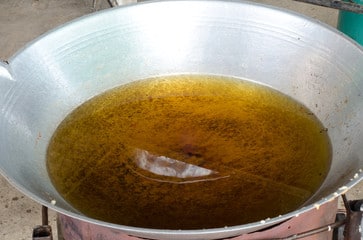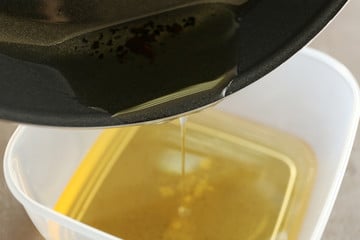Did you know, the food you cook, no matter how delicious or expensive it is, can be bad for you when cooked in an unhealthy way?
Also, no matter how great we are at cooking, there are habits or actions we unintentionally commit while cooking, which can make our food unhealthy.
Habits are tough to break, especially when you have been used to them for a long time. But when it comes to cooking, you may have to strive hard to break some bad habits because they can be detrimental to your health. I have always said in my health blogs that Nigerian meals are one of the healthiest meals ever. However, if it is not cooked in the proper way, it won’t be beneficial to you.
Cooking oils are one of the major ingredients used in cooking, however, is reusing cooking oil bad for you? This article discusses the answer to the question.
Is Reusing Cooking Oil Bad For You?

This is a habit that many Nigerians are guilty of, heck, even I too. The cost of cooking oils have drastically increased in Nigeria, so a lot of Nigerians have resorted to using used cooking oils when they want to cook or fry.
Used cooking oils and fats are those that have been used for cooking before. The European Waste Catalogue (EWC) classifies them as Municipal Wastes (household waste and similar commercial, industrial and institutional wastes).
Used oil is a harbour for bacteria and free radicals. Bacteria usually feed on food particles left in the oil after you use it, and it can lead to food poisoning.
Reused cooking oils usually contain free radicals, that destroy the body’s cells and increase cancer risk.
What can you do to repurpose your cooking oil?

Although reusing cooking oils can be bad for your health, there are steps you can do to make it better. You need to store it properly so it can safe for reuse. The following tips to reuse your cooking oil are:
1. As soon as the oil cools off to handle, sieve it through a clean layer of cloth, paper towels or filter paper to remove food particles.
2. Store it in a clean, transparent jar.
3. Don’t mix it with unused oil and seal the jar tightly.
4. Refrigerate the cooking oil.
5. Don’t reuse your cooking oil if it foamed or changed colour during heating.
6. Don’t reuse cooking if it has a foul odour or smells like the food you cooked.
7. Don’t fry your cooking oil above 375°F (or 190°C) because it can lead to the formation of 4-hydroxy-2-trans-nonenal (HNE) in the oil. HNE is a toxic compound that has been linked with an increased risk of various chronic diseases like stroke, atherosclerosis, high cholesterol, and liver diseases.
8. Buy oils with high smoke point (a smoke point is the temperature at which oil breaks down and begins to smoke), such as vegetable, olive peanut, soybean and safflower oils. You can fry these oils for above 375°F, and they will still be suitable for use.
As you have learnt, there are so many health effects of reusing cooking oil. However, if you follow these steps you can make your cooking oil safe for reuse.
Please join us on our social media platforms below. Don’t leave with dropping a comment or sharing this post!




Wow! Great info! Thanks for posting!
the reusing of oil is one of the major characteristics of Nigerian cooks, i always wondered if it was a good idea. Now i know for sure. thanks for this great post
Yes, you’re right. It’s common in Nigeria. I’m glad the article helped you.
I’ve always suspected that used cooking oil is not good – but I’m glad there are steps one can take to improve on this. Food can easily poison us as fast as it heals.
I am happy you benefited from the article, keep visiting http://www.healthguide.ng for more.
Jamaicans also reuse cooking oils Ns I never thought about it being bad practice. Thank you for the tips on how to reuse cooking oil appropriately.
Thank you for this. At least, there are healthier ways to improve oil reuse